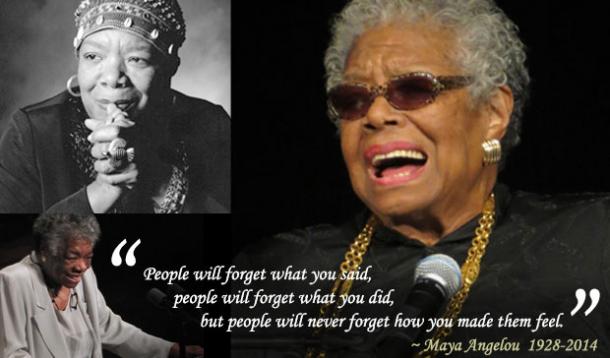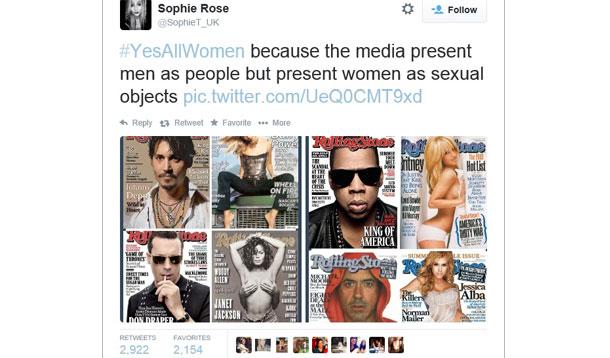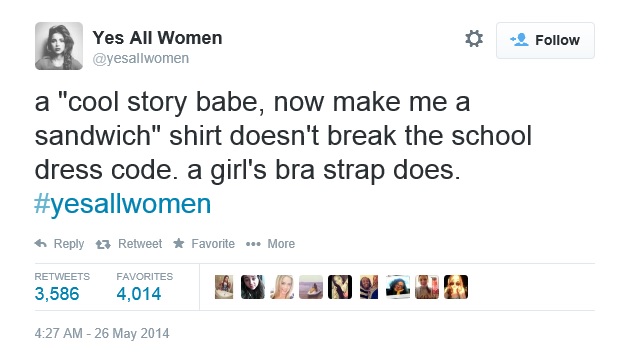
My introduction to Dr. Maya Angelou came late in life. I was 34 years old and going through a hard time watching my first marriage crumble. I had discussed my emotional state with a good friend, and the day after we talked, I received an email from her with the subject line "Phenomenal Woman." I almost didn't open it, thinking the last thing I needed at that moment was to bust up my pity-party-for-one with some joke or article about other women who were far more fantastic than I felt at that moment.
Thankfully, I didn't listen to my inner pessimist. Not only did the email contain a beautifully supportive message from my friend telling me that she felt the poem she had included was all about me, but it also provided an introduction to the power of one of the most gifted writers I have come to love and respect — Maya Angelou.
Pretty women wonder where my secret lies.
I'm not cute or built to suit a fashion model's size
But when I start to tell them,
They think I'm telling lies.
I say,
It's in the reach of my arms
The span of my hips,
The stride of my step,
The curl of my lips.
I'm a woman
Phenomenally.
Phenomenal woman,
That's me.
I walk into a room
Just as cool as you please,
And to a man,
The fellows stand or
Fall down on their knees.
Then they swarm around me,
A hive of honey bees.
I say,
It's the fire in my eyes,
And the flash of my teeth,
The swing in my waist,
And the joy in my feet.
I'm a woman
Phenomenally.
Phenomenal woman,
That's me.
Men themselves have wondered
What they see in me.
They try so much
But they can't touch
My inner mystery.
When I try to show them
They say they still can't see.
I say,
It's in the arch of my back,
The sun of my smile,
The ride of my breasts,
The grace of my style.
I'm a woman
Phenomenally.
Phenomenal woman,
That's me.
Now you understand
Just why my head's not bowed.
I don't shout or jump about
Or have to talk real loud.
When you see me passing
It ought to make you proud.
I say,
It's in the click of my heels,
The bend of my hair,
the palm of my hand,
The need of my care,
'Cause I'm a woman
Phenomenally.
Phenomenal woman,
That's me.
The poem resonated so greatly with me that I began to learn about the author's life of tragically humble beginnings with sexual abuse and a refusal to speak for many years. Her tragedies grew into triumphant accomplishments such as being one of the first female black screenplay writers and biography authors as well as working with both Malcolm X and Martin Luther King on the civil rights movement. She paved the way for abused women to find healing through writing about their experiences, as she was one of the first to do so at the time in her original in a series of memoirs "I Know Why The Caged Bird Sings." Her words are often so moving that to this day, I will re-read that poem when I'm feeling uninspired, unattractive or unintelligent — it has become my healing balm of phenomenal words.
Maya Angelou's life wasn't always an easy one, but she often spoke and wrote about the benefits of facilitating personal change and keeping a positive attitude no matter what your circumstances. She was not a woman given to self-pity or self-doubt, which is what so many of her fans, including myself, were drawn to. Listening to her speak, or sing, was a privilege. Her voice — deep and rich with the knowledge she gained from her life experiences — resonated with a timbre of serious but playful, intellectual yet approachable and loving with no-nonsense strict.
I often envied Oprah Winfrey's close friendship with her and likened Dr. Angelou to a fabulous auntie or grandmother, giving the gift of her wisdom to those who took away her words and thought about them carefully, searching for the hidden gems buried beneath what sometimes appeared as simple and straightforward prose.
Hollywood director John Singleton, who featured one of Maya Angelou's poems and a cameo appearance from her in his movie Poetic Justice, calls her a griot — the term for a traditional West African storyteller who is often looked upon as a sort of societal leader or advisor. I can't think of a better description, so of course it was only natural that I would introduce this phenomenal woman early on to my own phenomenal woman in-training — my daughter.
Among her many creative talents, Dr. Angelou wrote a children's book called "My Painted House, My Friendly Chicken and Me." Combined with eye-candy photographs by Margaret Courtney-Clarke, the book provides a visual feast and engaging story of what life is like for a young South African girl from the Ndebele nation of people who are famous for their incredibly painted houses and multiple layers of neck and leg rings. No doubt the book was intended as a cultural learning experience for North American and European societies, but in her incredible way, Maya Angelou continued her gifts to me by presenting my daughter with a piece of her cultural identity through this book.
My daughter is not of the Ndebele nation of people, but the book provides her with so many things that she lost through adoption — pictures (not drawings) of girls her age that live in her country of birth, a glimpse into some of the original people of her home country and an interest in the incredible mosaic of artistic talent that South Africa holds, just to name a few. It's no surprise that my daughter adores this book, and I only wish Dr. Angelou had written more children's books. It is a fun, interesting, thoughtful, cheeky, intelligent sharing of a culture — an embodiment of Dr. Maya Angelou herself.
As sure as I am that she will be missed by many, I have no doubt that the creative legends of Maya Angelou and her work will live on for many years, as it should.
She was, after all, a phenomenal woman.
Thanks for reading my post! If you'd like to read about another phenomenal inspiration, check out my tribute to Nelson Mandela, or grab a kleenex and check out the words of wisdom in this heartwarming video.

Yesterday I came across the #YesAllWomen movement. At that point I had only vaguely heard about the stabbing/shooting that motivated it, so I was unclear on all the details. I began to read everything I could to learn about the origin of the hashtag that has now become a worldwide phenomena after trending for two days, and the sad existence of Elliot Roberts, 22, and his YouTube diary of shame and blame towards women that led him to stab three men and shoot four women before turning the gun on himself.
I started to read the tweets tagged with #YesAllWomen and found myself mesmerized, nodding and mentally saying "Uh huh. Oh yes. Been there." to almost every one of them, despite the absence of any sexual assault in my own life.

That in itself was proof of the hashtag's message — that ALL women have been shamed, blamed, persecuted, belittled, judged, held back, sexualized, put down, or let down at some point in our lives, simply because of their gender and generations-old, socially-accepted norms that are prejudiced against women.

In addition to the tweets that I immediately identified with, there were even more that made me think: "Wow. I never even thought of THAT!" which exemplifies how subtly ingrained and how pervasive this problem really is.
The more I read, the more I felt sad and mad. Almost all of the posts resonated with me. Well, not the ones from the people tweeting about how "not all men are bad" — the hashtag was not created as a smear campaign against men or a rocket-launcher for some non-existent feminist agenda.

I tweeted a few statements of my own, and I know that education is power and anyone reading the hashtag stream was benefiting, but I felt useless and powerless — a victim of armchair slactivism.

Then it hit me — the search for a solution to this problem does not lie in what we tell our girls - to dress "appropriately" or to not walk alone in the dark — this problem is really about what we DON'T tell our BOYS — we don't educate our boys properly about how to treat girls and women and we certainly don't teach them empathy for what females deal with on an hourly basis. I am guilty of this as much as anyone else — I have a stepson living right under my nose, and I had been focusing all of my energies on teaching my young daughter how to stay safe — how to kick a man in the goolies if he tries to grab her, how to scream "Fire!" instead of help because nobody wants to get involved if someone is screaming for help. These lessons cannot be tossed out of our daughters' educations just yet, but I needed to expand my curriculum to the male half of my home-school.
So I did.
When dinner was finished, I asked my stepson to Google the hashtag #YesAllWomen and read it while I put my daughter to bed and finished folding laundry. Yes, feminists can fold laundry and still be feminists. Then I sat with him to talk about what he had read. We talked about the sad personal experiences of assault and abuse that women shared in the thread of tweets, we talked about how that is a big reason why women live in so much more fear than men do, we talked about what kind of man he wants to be when he grows up, we talked about dating girls and what girls are "obligated" to give him — NOTHING — no matter how much he spends on the date or how charming he thinks he is. We talked about what "no-means-no" means and we talked about what can happen when alcohol is involved. We talked about the tragedy of Retaeh Parsons and how we knew he was not capable of doing what those boys did to her, but that we also expected him to do something to help a girl if he was ever in a situation where a girl was being disrespected or assaulted by others.
The conversation was uncomfortable, I won't lie. It made both of us squirm at different points — not so easy to chat with your 13-year-old stepson about making out with a girl and him wanting to take it to the next level, but it was important and we both knew it, so he didn't ask me to stop out of embarrassment, and I said everything that I thought needed to be said.

My stepson understood most of the tweets and the deeper societal problem they represented. He agreed that he was definitely not the kind of guy who would ever hurt or disrespect a girl, but he also admitted that he had never considered much of what he read and that a lot of it made him feel sad for women. I know he will think more about our conversation over time and I'm sure we will have further discussions about what it means to be both a man and a woman.
Mission accomplished.
I don't think my stepson is capable of any kind of assault or intended disrespect to a female, on any level, but sadly, I bet the parents of many boys and men who have hurt girls thought they didn't need to have that kind of conversation with their sons, either. The whole point of the #YesAllWomen is to raise a higher degree of awareness and while my stepson may only be one teen-aged boy — it has to start somewhere.
I hope every parent of a boy has a similar conversation with their son — we need a new approach to an age-old problem.

Read our dad blogger Joe's take on this: #YesAllMen Should Care About #YesAllWomen

He was scowling at me, I was sure of it. I squeezed my new daughter even closer.
I knew that some people did not agree with trans-racial adoption, especially internationally. Considering South Africa's history, I understood their opposition. I assumed this was the source of the angry looks and outright frowns the man had been giving me. He was one of a group of twenty or more who were visiting a cultural heritage tourist park at the same time Huzbo and I were. We had gone because we thought it might be an interesting place to educate ourselves about the nation of people our daughter was born into.
We meandered through the park with the large group, viewing the snake and alligator zoo (ugh), learning about traditional homes, customs, and food of my daughter's ancestors, and watched a show of traditional dancing.
The group kept their distance. Nobody spoke to us, nobody smiled, even when we smiled at them. Sadly, it seemed clear to us what the general opinion of this group was on trans-racial international adoption.
I didn't focus all of my attention on the group, however. To be honest, I don't remember much of what we learned during the tour, either. I was a new mother and I was too busy staring at the beautiful new daughter in my arms, trying to learn who she was and ensuring I was meeting her every need before she needed them. I never put her down in the stroller, I fed her often, I sang quietly to her, and whispered my love repeatedly in her ear. She was a part of our family from the moment we saw the first picture of her, and I was still getting used to her real physical presence. I ignored the looks from the group, smiled when I made eye contact with anyone, and went about my business of being a mommy.
We enjoyed our visit to the park, and as most tourist attractions dictate, our tour ended in the gift shop. It was full of both touristy souvenirs and lovely African artwork, so we took a long time browsing and choosing some items that we could bring home to include in our decor. The group began to filter out to their waiting bus, but one woman seemed to be lingering, looking at me.
I could tell she wanted to speak to me, and I worried that perhaps she was going to challenge me with her negative opinion of how I had just become a mother. I steeled myself for that and smiled in what I hoped was a welcoming way.
"I've been watching you with that baby," she started in.
I explained to her that we had just adopted our daughter and were spending some time getting to know her country and her culture.
She eyed me up, pausing to inhale, hesitating with her words.
"You're a good mother, I can tell. You care for your baby very much."
Tears welled up in my eyes—touched by her compliment, but also ashamed for thinking the woman was going to confront me.
Her next words were even more stunning:
"There are so many babies here that have nobody to care for them. Thank you. Thank you for taking care of one of our children for us."
Then the tears came from her eyes, as well.
The woman knew that my daughter would be losing so much through her adoption—her first language, her birth culture, her ancestry, and her country of origin—yet she thanked me for adopting her. I didn't adopt my daughter for gratitude from others, and this woman couldn't possibly know that my motives were not an act of charity to care for a child who needed it, but to fulfil my longing to be a mother.
The magnitude of the woman's grace overwhelmed me and I think of that moment often.
The stranger-friend and I embraced. I thanked her for her kind words, then we said goodbye. I never asked her name, she never asked mine.
We were simply united by our mutual love for the child I held in my arms.
Hi! Thanks for reading my post. If you'd like another story about adoption perspective, you may like this one about a woman's misconception of our adoption. You may also like this story about another mom's experiences with adoption misconceptions and what she did about it.